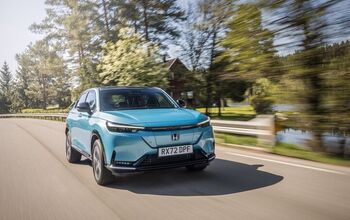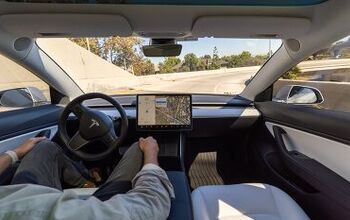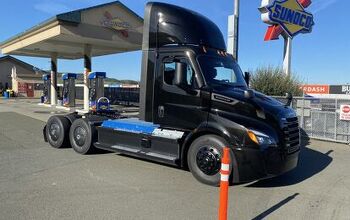The Atlantic Wants 100 MPG CAFE Standard, Small Cars, Cheap Gas
Marty Nemko is the “The Bay Area’s Best Career Coach”, and a contributor to The Atlantic as well as U.S. News, the Washington Post, Los Angeles Times, and San Francisco Chronicle. So what makes him qualified to sound off on raising the CAFE standard to 100 MPG.
Nemko’s column, dubbed “Driving Is A Freedom: The Case Against Making Gas More Expensive”, Nemko dismisses some of his readers’ previous suggestions to raise gas prices. Why? Because it wouldn’t help reduce global warming but cause the price of everything to rise.
What would be better, Nemko suggests, is smaller, more fuel efficient cars. Says Nemko
I would raise CAFE (Corporate Average Fuel Economy) standards so that every vehicle manufacturer’s fleet of cars and light trucks would, by 2025, average 100 miles per gallon. (Automakers have already agreed to 50 mpg.)
Yes, that would mean that until a breakthrough technology arrives, more new cars would be small, which would cause some increase in car crash injuries. And yes, to accommodate apartment dwellers without a place to plug-in their car, we’d need to expand the network of electric vehicle charging stations that the taxpayer created a decade ago when it was thought electric cars were nigh.
Nemko backs up his proposal with more questionable assertions
In addition to abetting energy independence and decreasing carbon footprint, the 100 mpg mandate would mean our cost-per-driving mile would dramatically decrease because of the better gas mileage and because the lower demand for gas would force oil companies to cut the price. Those cost savings benefit all of us significantly, particularly the poor–and with 100% certitude.
TTAC readers know that buying a newer, fuel efficient vehicle, let alone a hybrid, EV or alternative fuel vehicle rarely nets any significant savings compared to a well maintained older vehicle – and based on anecdotal evidence and observations, gas prices rarely tend to fall as much as we’d like, though they’re quick to rise with the price of crude oil. Finally, “the poor” are often the patrons of used car lots, in particular the “ buy here, pay here” kind that charge usurious interest, rather than the new car dealerships that offer lower financing rates, provided the applicant has decent credit.
Aside from the fact that Nemko said nothing to indicate that he is aware of the difference between “adjusted” and “unadjusted” CAFE numbers, the whole suggestion seems arbitrary and poorly thought out – sound familiar? Regulating Americans into smaller, more fuel efficient cars, via CAFE isn’t a viable solution, to the point where Nemko seems to be talking out of his ass. By publishing unsubstantiated, pie-in-the-sky proposals, The Atlantic is lending de facto credibility to sound-bite theories that hold little substance.
More by Derek Kreindler
Latest Car Reviews
Read moreLatest Product Reviews
Read moreRecent Comments
- Jeff If we are worried about the Chinese spying on us and gathering information then we need to make certain specifications on vehicles imported from China that would lessen any concerns about this. I don't see how we could eliminate all information gathering especially if that vehicle has connectivity to your phone.
- ToolGuy Oh look what's this?
- Jkross22 Gotta stop the spying Chinese!!!! Please. These parasites don't care about spying unless they're the ones profiting. US Commerce Secretary... another useless job that should be done away with.
- Canam23 I've rented them and found them...fine. I wish Ford had continued with or came up with a new generation Fusion which was a far better sedan.
- MaintenanceCosts The ES will do well in an electric version, assuming it's more thoroughly baked than the half-finished RZ. There's plenty of the Lexus customer base who use planes whenever they travel and don't need to drive their own cars outside the metro area.


































Comments
Join the conversation
And I want a world where competent engineers design vehicles based on what people want to buy, and people have brains enough so that "career coaches" either find themselves another career or starve to death.
On a side note(maybe it's been already mentioned), but it won't matter in terms of cost for any of us if gas mileage were 100MPG. Gas prices would increase to compensate for our going to the pump less often and we'll end up paying the same amount as before. Yeah, less gas will be consumed, but the price will not change significantly.